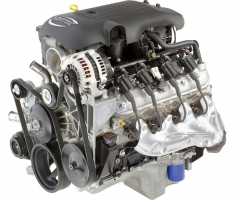— GM 5.3-liter engine problems have caused a class action lawsuit that alleges the Generation IV Vortec 5300 engines burn too much oil in these vehicles.
- 2010-2014 Chevrolet Avalanche
- 2010-2012 Chevrolet Colorado
- 2010-2013 Chevrolet Express
- 2010-2013 Chevrolet Silverado
- 2010-2014 Chevrolet Suburban
- 2010-2014 Chevrolet Tahoe
- 2010-2013 GMC Canyon
- 2010-2013 GMC Savana
- 2010-2013 GMC Sierra
- 2010-2014 GMC Yukon
- 2010-2014 GMC Yukon XL
According to the lawsuit, the Vortec engines burn abnormally high amounts of oil that is way above industry standards, resulting in low oil levels and engine damage.
The plaintiff claims piston rings in the 5.3-liter engines cause excessive oil consumption and engines that don't maintain tension to keep oil in the crankcases.
In addition, the plaintiff alleges the active fuel management system does not help. The system uses an oil pressure relief valve that assists the system by spraying oil directly at the piston skirts.
This oil spray allegedly overloads and fouls the defective piston rings and sends oil past the rings. The migrating oil either burns or accumulates as carbon buildup on the surface of the combustion chambers.
The class action also alleges a faulty PCV system vacuums oil from the valvetrain into the intake system where the oil is burned in the combustion chambers.
Oil loss and engine damage is also allegedly caused by defective oil life monitoring systems that don't advise drivers of oil levels until the levels are too low.
According to the plaintiff, the oil life monitoring systems don't monitor oil level. The systems monitor engine conditions such as the temperature and revolutions to calculate the oil quality. This allegedly helps a driver know when the oil should be changed.
This allegedly allows drivers to keep driving while the engines are damaged from a lack of oil lubrication.
The vehicles are also equipped with oil pressure gauges and oil canister images that illuminate when vehicles are low on oil. But the gauges allegedly don't provide any indication as to when the oil pressure falls to levels low enough to damage the 5.3-liter engines.
GM allegedly tried to do something about the engine problems by telling dealerships to decarbonize Vortec 5300 combustion chambers and rings with chemical abrasives, but the lawsuit says the repairs were inadequate. The lawsuit also alleges GM knew the engines consumed too much oil, so beginning with certain 2014 vehicles, General Motors redesigned the Vortec 5300 engines.
GM installed an improved sealing ring package, a shield that deflected oil spray away from the piston skirts and a new valve cover. In addition, the automaker also allegedly reintroduced oil level sensors. The plaintiff says this may have helped later models, but it did nothing for owners and lessees of vehicles which used previous Vortec engines.
The class action further alleges the automaker has known about the 5.3-liter engine problems dating back to 2007 based on complaints and technical service bulletins (TSBs) issued to dealerships.
The lawsuit alleges the TSBs admit the 5.3-liter engine problems are caused by PCV issues, problems with the piston rings and flaws in the active fuel management systems.
According to the class action lawsuit, the alleged oil consumption problems result in numerous problems.
"[S]park plug fouling, ring wear, lifter collapse, bent pushrods, camshaft wear, valve wear, rod bearing wear, rod breakage, wristpin wear, wristpin breakage, crankshaft wear and main bearing wear or destruction and other forms of internal component wear/breakage due to unacceptable heat and friction levels and oil breakdown."
The GM 5.3-liter engine lawsuit was filed in the U.S. District Court for the Northern District of Ohio, Cleveland Division - Szep, et al., v. General Motors LLC.
The plaintiff is represented by DiCello Levitt Gutzler.

